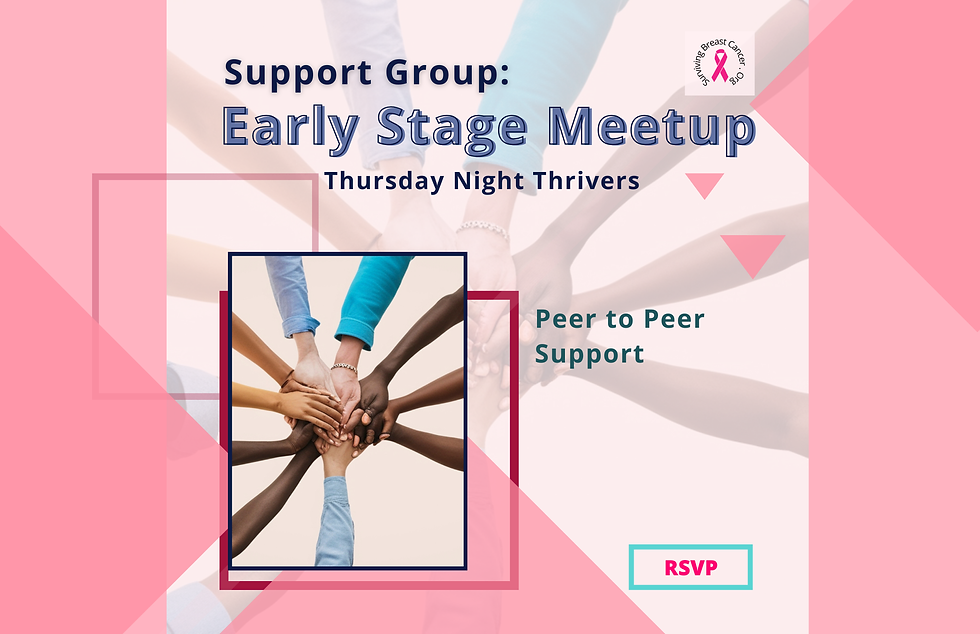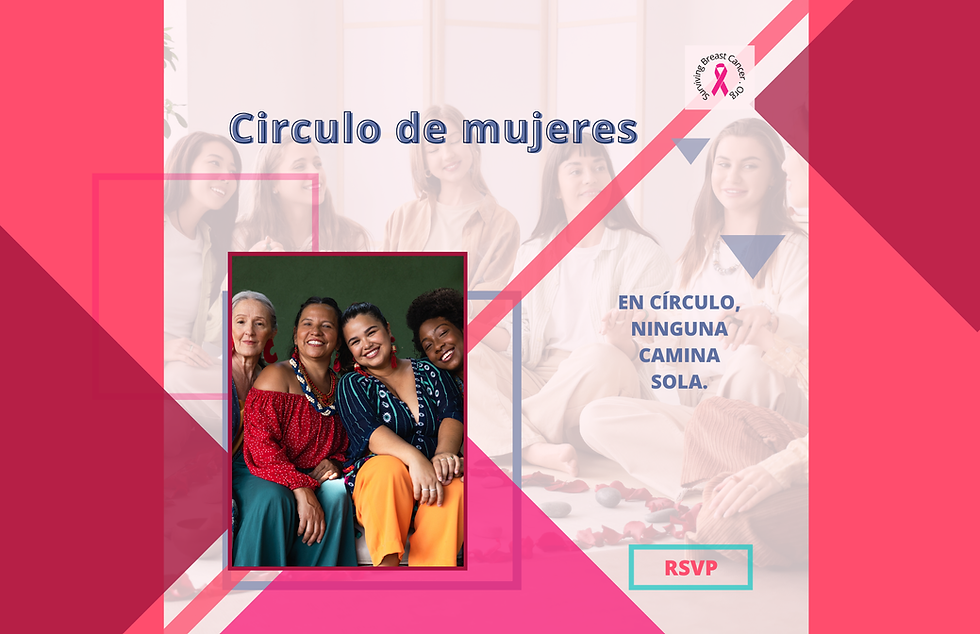Cerebral Palsy and Breast Cancer
- Surviving Breast Cancer

- Aug 7, 2022
- 5 min read
By Kathleen Friel, Ph.D.,

March Is Cerebral Palsy Awareness Month
I have the interesting opportunity to live with two types of medical issues – cerebral palsy (CP) and metastatic breast cancer (MBC). CP is usually a condition that a baby is born with or acquires during the first two years of postnatal life. CP is most often called by a stroke or brain bleed – yes, babies and kids can have strokes, even in utero. Sometimes, CP is caused by malformation of the brain or a genetic issue. The bottom line is that the brain damage resulting in CP causes movement challenges. Sometimes, people with CP also have challenges in sensation, vision, hearing, speech, and/or thinking.
I was diagnosed with CP around 1.5 years of age. The diagnosing neurologist told my parents I had no rehabilitative potential, and that the best life for me (and them) would be if they put me in an institution and focused on my soon-to-be-born brother.
Thankfully, they found a new doctor for me, pronto. The wonderful doctor who guided my family through my first years of life was funny (he never wore socks, something that my four-year-old self found hilarious) and encouraged my parents to treat me like they’d treat any other kid. Sure, I had plenty of surgeries to make my legs walk better, speech therapy that enabled me to order pizza during college, and physical therapy that enabled me to stroll the mall with my friends in junior high. When I was prescribed occupational therapy in first grade, I figured it must be time for me to begin job training. Little did I know, OT is a discipline that focuses on improving finer motor skills like typing, cutting up food, and fastening buttons.
I now run a clinical research lab at the Burke Neurological Institute in White Plains, NY. Soon after I got my PhD in neurophysiology, my dad tried to track down that neurologist who had given me such a grave prognosis. No luck. I would have loved to see his face when he learned that I indeed spend most of my time in an institution… running a research program!
Greater Awareness is Sorely Needed
My multi-faceted relationship with cerebral palsy (CP) gives me a rather unique perspective on CP awareness. The mission of my lab at BNI is to develop novel therapies for people with CP that are rooted in a deep understanding of the neurobiology of CP. Through our research, I’ve gotten to know hundreds of children and their families as they navigate life with CP. For those who have only ever met me over Zoom, now you know, it’s not my audio connection that garbles my speech, it’s CP! These perspectives all converge to one theme: greater awareness is sorely needed.
Approximately 3 in 1,000 people have CP, which translates to approximately 800,000 people in the United States, and over 18 million people worldwide – approximately 50-50% split between children and adults. To put these numbers in perspective, 800,000 people is equivalent to the population of Seattle, and 18 million individuals is equivalent to the population of the state of New York.
The Demand for Cerebral Palsy Research
Recently, research has demonstrated molecular and cellular consequences of CP. People with CP typically expend 3-5x the energy of their nondisabled peers to perform activities of daily living. Muscles and bones in people with CP have less of an organized structure than in nondisabled peers – interestingly, some of these structural differences occur before a baby shows motor symptoms of CP. This raises the possibility that muscle and bone cellular disorganization contributes to the development of motor symptoms, rather than emerge as a consequence of aberrant movement.
Much research is necessary. The work in my lab is focused on improving movement in school-aged children, to help kids gain more skillful movement ability, which then poises them to improve their confidence, quality of life, and independence. More work is needed to define early biomarkers of CP: despite most brain injuries occurring before or near the time of birth, kids are often not diagnosed until or after their first birthday. If we can diagnose early, we may find ways to intervene and prevent emergent impairments.
We also need therapies to help adults with CP age well – many adults with CP develop age-related conditions like osteoporosis decades before nondisabled peers. Adults with CP 3x more likely to get MBC than people without CP, as I’ve learned in 2018, “Unstoppable: How Dr. Kathleen Friel has made incredible accomplishments despite cerebral palsy and metastatic breast cancer”! Although CP is not a progressive neurological disorder, adults with CP experience greater pain, fatigue, and loss of mobility earlier in life than adults without CP.
Going Beyond the Science
Greater awareness about CP must go beyond the science. What’s it like to live with CP? I’m only one person, and my experiences do not generalize to all people with CP. Here’s a bit of my perspective. People often assume I have a cognitive impairment because of how I speak. It’s exhausting to deal with misperceptions. 2020 was a great year for avoiding unsuspecting strangers! By far, the most difficult aspect of my CP is my speech. Zoom chat is amazing, and trying to be understood while I’m wearing a mask is frustrating. Most importantly, people with CP – and other disabilities – want to be known as people. We have rich social lives, hobbies, favorite sports teams, and so much to offer. We’re more than the way we move or talk.
Did you know…? People with CP and other disabilities spearheaded landmark legislation that protects the rights of people with disabilities, including the Rehabilitation Act and the Americans with Disabilities Act. The movie Crip Camp shares their story (available on Netflix!). In one part of the movie, people with disabilities held a sit-in in Sacramento to fight for accessibility in the 1970s. At one point, the disgruntled police shut off the phone system, so people could not call their supporters outside. Shortly after, some deaf participants went to the windows of the building and used sign language to communicate with the people outside. The police couldn’t stop them, and eventually conceded!
The MBC Connection

I was diagnosed with MBC in 2018, with a lesion in my spine. I think that the joint pain and mouth sores caused by my treatment exacerbate my CP impairments. Some days, speaking clearly and moving freely are quite difficult. I’ve needed more accommodations, and my fatigue (already a “CP issue”) can be frustrating. I have a wonderful oncology care team, but sometimes nurses, radiology staff, and others can make annoying assumptions about my cognitive capacity. Even answering, “Who is with you and how did you get here?” with, “Nobody, and I drove my damn self,” can be that “one more thing” that zaps my last nerve. I usually don’t say damn, but maybe I should! We all know how deflating it can be to go to our appointments, wait forever, get poked and prodded, literally eat/infuse poison in hopes it will only kill the cancer calls, and listen to that bossy little “Breathe in, hold your breath………. breathe out,” CT scanner voice. After that, if someone insists on taking me out to my caregiver, I want to throw a punch.
But there is always hope. In December, a radiologist really pissed me off. A kind nurse asked me what was wrong, and I started crying. I pulled up my “Unstoppable” article, linked above, on my phone and gave it to her. Then she started crying! She asked permission to share it with the radiology department. I went for my next CT, and everyone was all smiles and pats on the back. I saw the same nurse, and she gave me a big hug.
Many people with breast cancer have other health issues. I’m grateful for the opportunity to share my “CP + MBC” story during CP Awareness Month. We all have a complex identity, and the greatest gift we can give each other is compassion and kindness.










